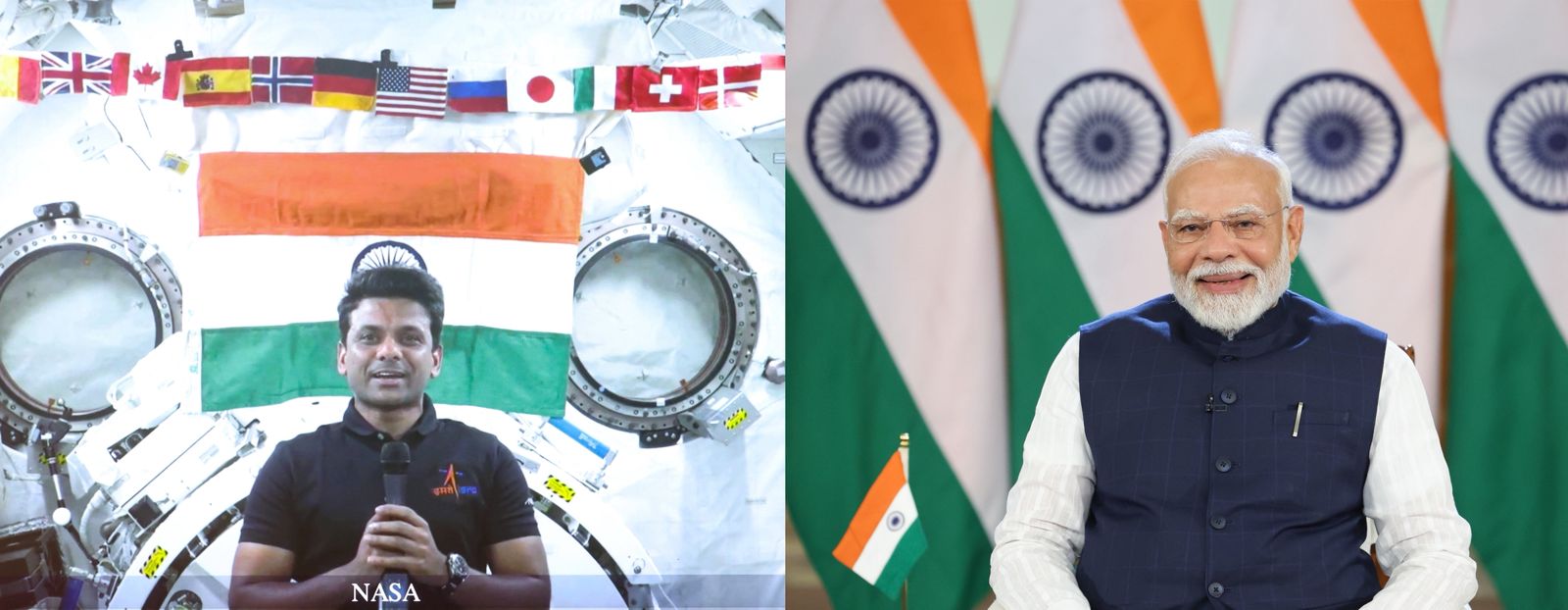
India’s Fearless Stride in Space – Shubhanshu Shukla’s Farewell from ISS
CLAT Gurukul – best online coaching for CLAT
“online coaching for CLAT”, “CLAT Current affairs 2026”, “Current Affairs 2026”
Introduction
India has arrived. That’s the message Group Captain Shubhanshu Shukla conveyed during his emotional farewell address aboard the International Space Station (ISS) as part of the historic Axiom-4 private mission. His message—delivered in both Hindi and English—wasn’t just about personal achievement. It was a signal that India is ready to take on leadership roles in global space exploration. His words, “Today’s India looks fearless, confident, and ambitious,” symbolized the assertive global posture India is beginning to adopt, not just in diplomacy and economics, but also in science and space technology.
Contrary View
While the achievements of Shukla and India’s contribution to the Axiom-4 mission are laudable, it also highlights how far the nation still has to go in terms of having its own independent human spaceflight capability. India still relies on collaborative international missions for human space access, whereas countries like the US, China, and Russia have well-established astronaut programs. Shukla’s words—“our journey may be long and arduous but it has begun”—are themselves a sobering reminder of the early phase India is still in.
Why in News?
- On July 13, 2025, Indian astronaut and Axiom-4 crew member Shubhanshu Shukla delivered a farewell address aboard the ISS.
- Shukla’s return marks a milestone in India’s presence in private space exploration missions.
- The Ax-4 mission, including crew from India, USA, Poland, and Hungary, concluded after an extended stay of 17 days due to weather delays.
- The undocking was scheduled for July 14th, 2025, with splashdown near the California coast expected the next Tuesday.
Point-Wise Summary for CLAT 2026 Aspirants
- Farewell from ISS:
- Shubhanshu Shukla gave a farewell address from the International Space Station (ISS) on July 13, 2025.
- He represented India on the Axiom-4 mission—a private international spaceflight initiative.
- India’s Image from Space:
- Shukla spoke about how India looks “ambitious, fearless, confident, and proud” from space.
- Recalled Rakesh Sharma’s iconic “Saare Jahan Se Accha” moment, linking past with present.
- India’s Space Journey:
- Emphasized the start of a long, challenging journey in space exploration for India.
- Delivered his message in Hindi and English to connect emotionally with the Indian populace.
- Ax-4 Mission Composition:
- Included US astronaut Peggy Whitson, Poland’s Slawosz Uznanski-Wisniewski, Hungary’s Tibor Kapu, and India’s Shukla.
- They launched on June 25, reached ISS next day, stayed longer than expected (17 days instead of 14).
- Science and Diplomacy Blend:
- Shukla praised scientific experiments and international collaboration at ISS.
- Believed experiments conducted may have implications beyond the scientific field.
- Praise from Peers:
- Other astronauts appreciated Shukla’s professionalism and contributions.
- One astronaut called it a “new standard for a private astronaut mission.”
- Learning and Legacy:
- Shukla spoke of “fond memories and learnings” from the ISS.
- Hoped experiments done would benefit future space research.
- ISRO’s Confirmation:
- Indian Space Research Organisation confirmed Shukla performed all planned Indian experiments at the ISS.
- These Indian-led experiments were deemed “highly successful.”
- Return and Rehabilitation:
- Splashdown planned near California coast.
- Post-splashdown: rehabilitation under Flight Surgeons to adapt astronauts back to Earth’s gravity.
- ISRO’s Vision Ahead:
- ISRO said the success would help build “Gaganyaan,” India’s indigenous human spaceflight mission.
- Emphasis on collaboration and future missions.
Notes on Peculiar Terms
Term | Meaning |
ISS (International Space Station) | A multinational space laboratory orbiting Earth; used for scientific research and international cooperation. |
Ax-4 Mission | The fourth private astronaut mission organized by Axiom Space, involving a multinational crew. |
Splashdown | Landing of a spacecraft in a body of water (usually ocean) after re-entering Earth’s atmosphere. |
Gaganyaan | India’s first human spaceflight mission led by ISRO, targeting manned missions by 2026. |
Flight Surgeon | Medical specialists trained in aerospace medicine, responsible for monitoring astronauts’ health. |
Undocking | Detachment of a spacecraft from the ISS to return to Earth. |
Private Astronaut Mission | Missions organized by private firms like Axiom Space, often with international and commercial collaboration. |
Relevance for CLAT Current Affairs 2026
This event marks a fusion of science, diplomacy, and national aspiration—important themes for CLAT GK and Legal Reasoning sections. Key angles:
- India’s Global Positioning:
- India is now visibly participating in commercial space operations.
- Shukla’s participation shows India’s growing reputation in international scientific missions.
- ISRO’s Expanding Role:
- Beyond launching satellites, ISRO is now involved in human space science.
- India’s future Gaganyaan mission connects directly to this international milestone.
- Space and Law:
- The evolution of private missions raises new legal questions: space jurisdiction, astronaut nationality, and international agreements (Outer Space Treaty).
- India’s participation increases its stake in global space law and treaties.
- Private vs. Public Sector:
- Axiom Space’s private mission reflects a global trend of commercializing space.
- Raises questions about India’s readiness to regulate and collaborate in this sector.
Critical Thinking for Legal Aspirants
- Does India’s participation in private missions signal a shift toward privatizing space like the U.S.?
- How does India ensure legal protection and liability coverage for astronauts aboard foreign spacecraft?
- What laws govern Indian space research in international missions?
- Should India fast-track domestic human space programs or continue international collaborations?
Conclusion
Group Captain Shubhanshu Shukla’s farewell message from the ISS stands as a historic moment, both in symbolic and substantive terms. While it encapsulates the optimism and aspiration of “New India,” it also reveals the challenges and dependencies that still exist. For CLAT 2026 aspirants, this is not just a current affairs update—it’s a case study in science, diplomacy, law, and ambition.




